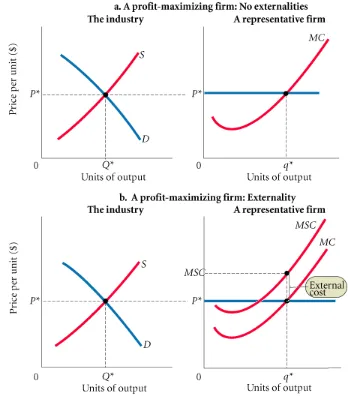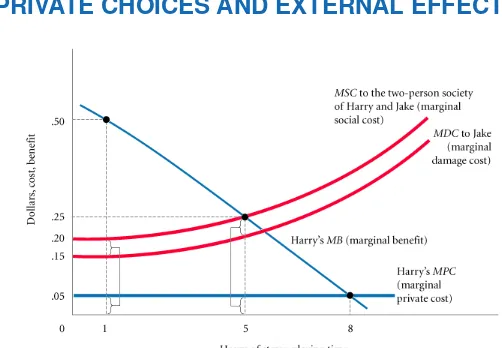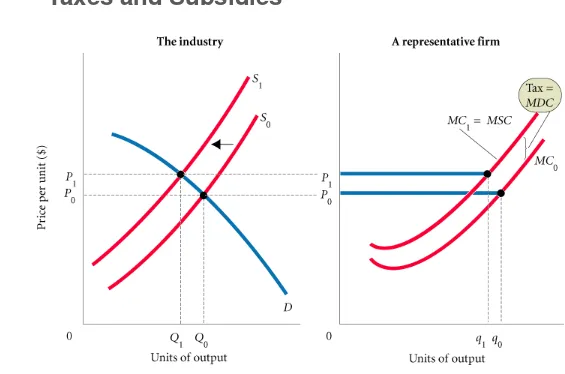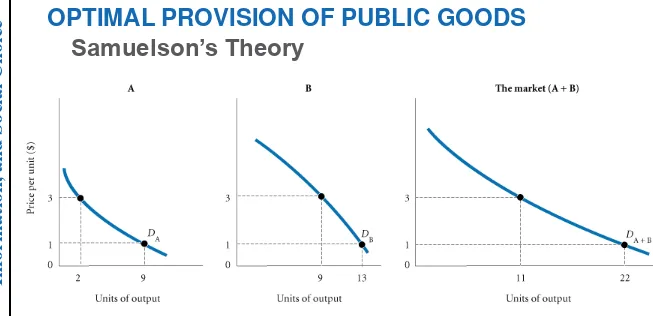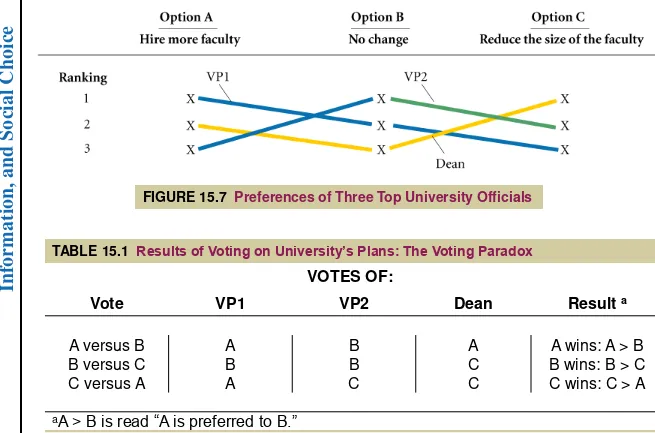Prepared by:
Fernando & Yvonn Quijano
15
Chapter
Externalities, Public Goods,
Imperfect Information,
APTER
Externalities, Public Goods,
Imperfect Information,
and Social Choice
Externalities and Environmental EconomicsMarginal Social Cost and Marginal-Cost Pricing
Private Choices and External Effects Internalizing Externalities
Public (Social) Goods
The Characteristics of Public Goods Mixed Goods
Income Distribution as a Public Good? Public Provision of Public Goods Optimal Provision of Public Goods
Local Provision of Public Goods: Tiebout Hypothesis
Imperfect Information
Adverse Selection: Asymmetric Information Moral Hazard
Market Solutions Government Solutions
Social Choice
The Voting Paradox
Government Inefficiency: Theory of Public Choice
APTER
EXTERNALITIES, PUBLIC GOODS, IMPERFECT
INFORMATION, AND SOCIAL CHOICE
market failure Occurs when resources are
misallocated or allocated inefficiently.
APTER
EXTERNALITIES AND ENVIRONMENTAL
ECONOMICS
APTER
EXTERNALITIES AND ENVIRONMENTAL
ECONOMICS
marginal social cost (MSC) The total cost
to society of producing an additional unit of a good or service. MSC is equal to the sum of the marginal costs of producing the
product and the correctly measured damage costs involved in the process of production.
APTER
EXTERNALITIES AND ENVIRONMENTAL
ECONOMICS
APTER
EXTERNALITIES AND ENVIRONMENTAL
ECONOMICS
Acid Rain and the Clean Air Act
Acid rain is an excellent example of an externality and of the issues and conflicts in dealing with
externalities.
The case of acid rain highlights the fact that
efficiency analysis ignores the distribution of gains and losses. That is, to establish efficiency we need only to demonstrate that the total value of the gains exceeds the total value of the losses.
APTER
EXTERNALITIES AND ENVIRONMENTAL
ECONOMICS
PRIVATE CHOICES AND EXTERNAL EFFECTS
APTER
EXTERNALITIES AND ENVIRONMENTAL
ECONOMICS
marginal damage cost (MDC) The
additional harm done by increasing the level of an externality-producing activity by one unit. If producing product X pollutes the water in a river, MDC is the additional cost imposed by the added pollution that results from increasing output by one unit of X per period.
When economic decisions ignore external costs, whether those costs are borne by one person or by society, those decisions are likely to be inefficient.
marginal private cost (MPC) The amount
APTER
EXTERNALITIES AND ENVIRONMENTAL
ECONOMICS
INTERNALIZING EXTERNALITIES
Five approaches have been taken to solving the problem of externalities:
(1) government-imposed taxes and subsidies,
(2) private bargaining and negotiation,
(3) legal rules and procedures,
(4) sale or auctioning of rights to impose
externalities, and
APTER
EXTERNALITIES AND ENVIRONMENTAL
ECONOMICS
Taxes and Subsidies
APTER
EXTERNALITIES AND ENVIRONMENTAL
ECONOMICS
Bargaining and Negotiation
Coase theorem Under certain conditions,
APTER
EXTERNALITIES AND ENVIRONMENTAL
ECONOMICS
Legal Rules and Procedures
injunction A court order forbidding the continuation of behavior that leads to damages.
APTER
EXTERNALITIES AND ENVIRONMENTAL
ECONOMICS
Selling or Auctioning Pollution Rights
APTER
EXTERNALITIES AND ENVIRONMENTAL
ECONOMICS
Direct Regulation of Externalities
Taxes, subsidies, legal rules, and public auction are all methods of indirect regulation designed to induce firms and households to weigh the social costs of their actions against their
benefits.
APTER
PUBLIC (SOCIAL) GOODS
public goods (social or collective goods) Goods that are nonrival in consumption
and/or their benefits are nonexcludable.
APTER
PUBLIC (SOCIAL) GOODS
nonrival in consumption A characteristic
of public goods: One person’s enjoyment of
the benefits of a public good does not
interfere with another’s consumption of it.
THE CHARACTERISTICS OF PUBLIC GOODS
APTER
PUBLIC (SOCIAL) GOODS
free-rider problem A problem intrinsic to public goods: Because people can enjoy the benefits of public goods whether they pay for them or not, they are usually
unwilling to pay for them.
drop-in-the-bucket problem A problem
intrinsic to public goods: The good or
service is usually so costly that its provision generally does not depend on whether or not any single person pays.
Consumers acting in their own self-interest have no incentive to contribute voluntarily to the production of public goods. Some will feel a moral responsibility or social pressure to
APTER
PUBLIC (SOCIAL) GOODS
MIXED GOODS
mixed goods Goods that have
characteristics that are part public and part private.
INCOME DISTRIBUTION AS A PUBLIC GOOD?
If we accept the idea that redistributing income generates a public good, private endeavors may fail to do what we want them to do, and government involvement may be called for.
PUBLIC PROVISION OF PUBLIC GOODS
When members of society get together to form a
APTER
PUBLIC (SOCIAL) GOODS
OPTIMAL PROVISION OF PUBLIC GOODS
Samuelson’s Theory
FIGURE 15.4 With Private Goods, Consumers Decide What Quantity to Buy; Market Demand Is the Sum of Those Quantities at Each Price
The price mechanism forces people to reveal what they want, and it forces firms to produce only what people are willing to pay for, but it works this way only because exclusion
APTER
PUBLIC (SOCIAL) GOODS
FIGURE 15.5 With Public Goods, There Is Only One Level of Output, and Consumers Are Willing to Pay Different Amounts for Each Level
For private goods, market demand is the horizontal sum of individual demand
curves—we add the different quantities that households consume (as measured on the
horizontal axis). For public goods, market demand is the vertical sum of individual demand curves—we add the different
APTER
PUBLIC (SOCIAL) GOODS
APTER
PUBLIC (SOCIAL) GOODS
optimal level of provision for public goods The level at which resources are drawn from the production of other goods and services only to the extent that people want the public good and are willing to pay
for it. At this level, society’s willingness to
pay per unit is equal to the marginal cost of producing the good.
At the optimal level, society’s total willingness to pay per unit is equal to the marginal cost of
APTER
PUBLIC (SOCIAL) GOODS
The Problems of Optimal Provision
APTER
PUBLIC (SOCIAL) GOODS
Tiebout hypothesis An efficient mix of public goods is produced when local
land/housing prices and taxes come to reflect consumer preferences just as they do in the market for private goods.
APTER
adverse selection Can occur when a
buyer or seller enters into an exchange with another party who has more
information.
APTER
moral hazard Arises when one party to a contract passes the cost of its
behavior on to the other party to the contract.
MORAL HAZARD
APTER
Like consumers, profit-maximizing firms will gather information as long as the marginal benefits from continued search are greater than the marginal costs.
GOVERNMENT SOLUTIONS
Information is essentially a public good and is nonrival in consumption.
When information is very costly for individuals to collect and disperse, it may be cheaper for
APTER
social choice The problem of deciding what society wants. The process of
APTER
THE VOTING PARADOX
impossibility theorem A proposition demonstrated by Kenneth Arrow
showing that no system of aggregating individual preferences into social
APTER
FIGURE 15.7 Preferences of Three Top University Officials
TABLE 15.1 Results of Voting on University’s Plans: The Voting Paradox
APTER
voting paradox A simple demonstration
of how majority-rule voting can lead to seemingly contradictory and inconsistent results. A commonly cited illustration of the kind of inconsistency described in the impossibility theorem.
logrolling Occurs when congressional representatives trade votes, agreeing to help each other get certain pieces of
APTER
GOVERNMENT INEFFICIENCY: THEORY OF PUBLIC CHOICE
To understand the way government functions, we need to look less at the preferences of
individual members of society and more at the incentive structures that exist around public officials.
RENT-SEEKING REVISITED
APTER
GOVERNMENT AND THE MARKET
GOVERNMENT INEFFICIENCY: THEORY OF PUBLIC CHOICE
There is no question that government must be involved in both the provision of public goods and the control of externalities.
The question is not whether we need
government involvement. The question is how much and what kind of government involvement
APTER
oice adverse selection
Coase theorem
marginal damage cost (MDC)
marginal private cost (MPC)
marginal social cost (MSC)
REVIEW TERMS AND CONCEPTS
market failure mixed good moral hazard nonexcludable
nonrival in consumption
optimal level of provision for public goods
public goods (social or collective goods) social choice
